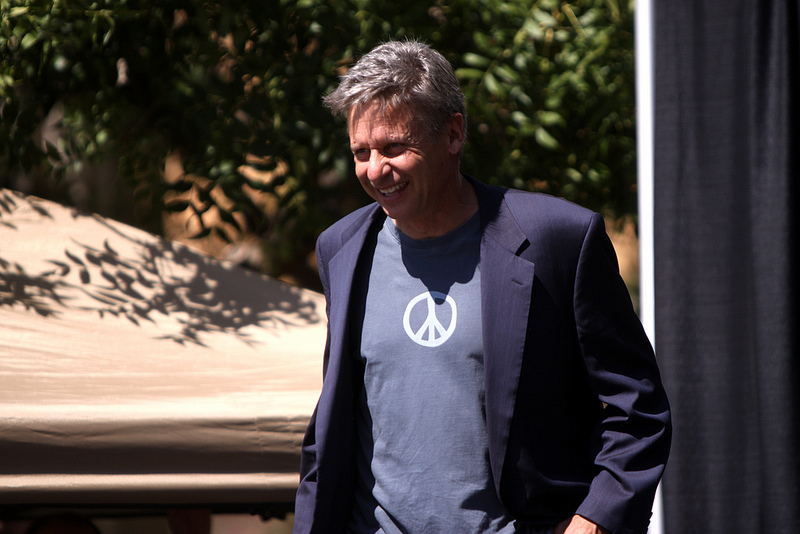Gary Johnson: America Gets to Know the Libertarian Candidate's Policy, and Family
Kill NSA and IRS; maybe NAFTA was a bad idea? And driven by asking whether any government action will really "make things better."
Libertarian presidential candidate Gary Johnson's media campaign continues, as he fights to get himself so well known and discussed in political media that the polls can no longer justify ignoring him. (And getting into the polls, and getting at least 15 percent in five of them as chosen by the Commission on Presidential Debates, will be key to getting into the debates, what Johnson often calls the "Super Bowl of politics.")

Two big interviews this week in political-junkie journals The Hill and Politico highlight different parts of Johnson; the first more the radical policies, the second more the history of the man.
In The Hill, Johnson discussed big elements of the federal government he intends to chop, from the National Security Agency to the Internal Revenue Service:
"The NSA is a complete executive order as it is under [President Harry] Truman," Johnson said. "We could turn those satellites on what is supposed to be the enemy. The fact that they're pointed on us right now, doesn't that cause everyone a bit of concern? It should. Look, there's due process for spying, but due process is not blanket collection of all of our data."….
Johnson also said he would eliminate the IRS and lower taxes.
"If I could wave a magic wand, we would eliminate income tax; we would eliminate corporate tax; we would abolish the IRS; and we could replace all of it with one federal consumption tax," Johnson said.
"If we had zero corporate tax in this country, tens of millions of jobs would get created in this country for no other reason," he added.
Johnson also suggested he would eliminate numerous other federal agencies — including the Department of Commerce, Department of Housing and Urban Development (HUD), and Department of Education — if presented with legislation to do so.
In a long interview with Politico, he got into great detail about his parents and his siblings (after the usual great, great, perhaps too great, emphasis on Johnson as the presidential candidate who is honest and direct about his appreciation for marijuana).
He praised his mother for, according to Johnson, being responsible for balancing the books for the Bureau of Indian Affairs. His father was in the 101st Airborne Division in World War II:
He paratrooped into Normandy before D-Day….--you know, the Band of Brothers?…That was my father….Saving Private Ryan. That was the 101st. I mean, my father got bayoneted in the back at the Battle of the Bulge….He went through all of it. He was Band of Brothers. That was the story of the 101st, all the way through the war.
His brother Scott is "the best cardiothoracic surgeon in the world, and I know that for a fact because he tells me that all the time….the head of cardiothoracic surgery at the University of Texas at San Antonio, a big, big medical center." His sister is a retired schoolteacher.
Johnson suggests in this interview (after much discussion of Trump's offensive foolishness on immigration) he might not have signed NAFTA, being for more pure free trade than the crony capitalism often embedded in international trade deals. He agreed with getting Osama Bin Laden, and suggests that should have been the core goal post 9/11 as opposed to starting more than one multi-year war.
Johnson also said one of the things that makes some libertarians doubt whether he instinctively goes for the no-government-action, leave-it-alone answer to policy questions, suggesting (after aptly pointing out that government intervention in the student loan market likely bears a great deal of responsibility for how expensive college is):
I would really take a hard look at how students might, I don't know, receive some sort of benefit or reduced interest rate. I mean, if we can--if the Federal Reserve can bail out all the big banks, it seems to me that we might arrange lower interest rates for these loans to get paid back.
He follows this up with a statement of principles that sums up why a sensible, aware politician might often have a libertarian answer without having an across-the-board libertarian attitude that "there needs to be a reason related to defense of life or property for government to act":
count on me to--as president of the United States, count on me--and this is what I did as governor. You know, we did an analysis of every single bill, and at the end of the day was the bill going to make things better? Was the average citizen's life going to be improved by the legislation or, at the end of the day, was it just going to add time and money and really not accomplish anything?
Well, for the most part, time and money got added, and at the end of the day I stood up and said, "I don't think this is going to make a difference in any of our lives. Sounds good. Looks good. It's a problem that we have. But government solving it with this piece of legislation? Uh-uh."
There is a big gap that bothers many libertarians between asking "is this a just or appropriate use of government power?" and Johnson's asking, will government action "make things better"? Still, it would be an improvement if an American president thought like Johnson does.


Show Comments (194)